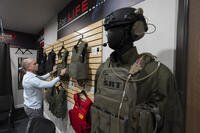Turkey renewed threats over the weekend to attack a town in northern Syria where U.S. troops maintain an outpost, despite warnings from President Donald Trump.
In a phone call last Wednesday to Turkish President Recep Tayyip Erdogan, Trump urged Turkey to "de-escalate" in northern Syria and "avoid any actions that might risk conflict between Turkish and American forces" in the town of Manbij.
The current drive by Turkish forces against a Kurdish enclave around the town of Afrin, about 60 miles east of Manbij, also "risks undercutting our shared goals in Syria," which is the elimination of the Islamic State of Iraq and Syria (ISIS), Trump said, according to a readout of the call provided by the White House.
However, Erdogan on Saturday said he planned to "foil games along our borders starting from Manbij," adding that Turkey would "clean our region from this trouble completely."
Earlier, Deputy Prime Minister Bekir Bozdag, who also serves as Ankara's chief spokesman, said, "The United States needs to review its soldiers and elements giving support to terrorists on the ground in such a way as to avoid a confrontation with Turkey."
On Monday, Bozdag said at diplomatic meetings in Ankara, "It is irrational to expect Turkey to overlook the formation of a terror state on its border," Turkey's Anadolu news agency reported.
The "terrorists" he referred to are the U.S.-backed Kurdish fighters of the YPG, or People's Protection Units.
They are the dominant group in the U.S.-armed and -trained Syrian Democratic Forces, which last year took Raqqa, the self-proclaimed ISIS capital, and have cleared most of eastern Syria of ISIS.
On Jan. 20, Turkey launched Operation Olive Branch with a ground assault on the Afrin region, backed by tanks, artillery, drones, fixed-wing aircraft and helicopter gunships. Turkey has charged that its Kilis province has periodically been hit by mortar and artillery fire coming from the Afrin region.
Turkey views the YPG as the armed wing of the PYD, or Democratic Union Party. Turkey also views the PYD as an affiliate of the PKK, or Kurdish Workers Party, which has been labeled a terrorist group by Turkey and the U.S.
Turkey has repeatedly stated that it will not tolerate a Kurdish mini-state along its border, and the situation in the region became even more complicated when the Kurdish-led administration in Afrin called for help from its nominal enemy, the regime of Russian-backed Syrian President Bashar al-Assad.
"We call on the Syrian state to carry out its sovereign obligations toward Afrin and protect its borders with Turkey from attacks of the Turkish occupier," the Afrin Kurds said in a statement on their website.
At a Pentagon briefing last Thursday, Marine Lt. Gen. Kenneth McKenzie, director of the Joint Staff, said, "We haven't trained or provided equipment for any of the Kurds that are in the Afrin pocket."
He said the U.S. is mainly focused on backing the Syrian Democratic Forces to the south and east in clearing up remaining ISIS holdouts in the middle Euphrates River Valley.
"Turkish operations in Afrin and all operations in Afrin that have the effect of inducing friction into the equation, of making it hard to focus on why we're in Syria -- which is the defeat of ISIS in the Euphrates River Valley, are a negative thing," McKenzie said.
However, "we also recognize Turkey has a legitimate national security interest" in maintaining a safe border area, "and they're very close to the problem," he said.
"They're the only NATO ally that actually has an active insurgency [the PKK] operating on their territory, so we understand all of those things," McKenzie said.
"I can't speculate on whether or not they'll chose to go to Manbij," he said of the Turkish forces. "That's a future, you know, hypothetical that of course we look at."
"I would tell you that wherever U.S. troops are, they're going to be able to defend themselves, and we coordinate very closely with the Turks on that. They know where our forces are; there's no mystery about where they're going to be," McKenzie said.
The U.S. currently has about 2,000 troops in Syria in the train, advise and assist role, according to the Pentagon, and a small element of U.S. troops has since last March maintained an outpost in Manbij, where they have occasionally come under fire.
Army Rangers and Stryker vehicles first moved into Manbij last March to conduct "deterrence patrols" when Turkish forces and Syrian regime forces separately began converging on the crossroads town near the Turkish border and threatened to overrun it. The Turkish and Syrian forces later backed off.
In August, U.S. troops came under sniper fire several times, but there were no casualties or damages to equipment.
Army Col. Ryan Dillon, a spokesman for Combined Joint Task Force-Operation Inherent Resolve, said at the time, "There were engagements. They were with small-arms fire that were directed toward our patrols. There was more than one."
The U.S. troops did not return fire, he said. "We did not engage," but "we do reserve the right to defend ourselves."
After a lengthy siege, Manbij was liberated from ISIS in August 2016 by the U.S.-supported Kurdish YPG. The insertion of the Rangers in March 2017 came as Syrian regime forces backed by Russia approached the town from the south and Turkish forces and their allied Free Syrian Army militia pressed from the east.
Turkey has threatened to take Manbij before, but nothing came of it.
In February 2017, Erdogan said the next move by his military would be against Manbij to ensure Turkish border security, but his forces later withdrew from areas east of the town.
-- Richard Sisk can be reached at Richard.Sisk@Military.com.













